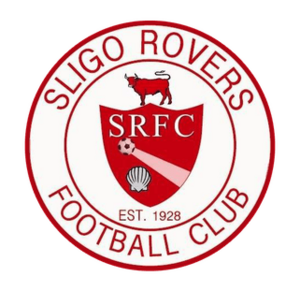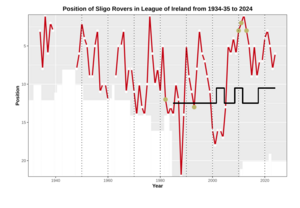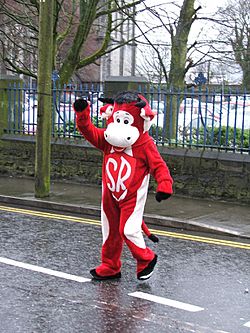Sligo Rovers F.C. facts for kids
 |
||||
| Full name | Sligo Rovers Football Club | |||
|---|---|---|---|---|
| Nickname(s) | The Bit O'Red, Rovers | |||
| Founded | 1928 | |||
| Ground | The Showgrounds | |||
| Capacity | 5,500 (4,000 seated) | |||
| Owner | Supporter-owned | |||
| Chairman | Tommy Higgins | |||
| Manager | John Russell | |||
| League | League of Ireland Premier Division | |||
| 2024 | League of Ireland Premier Division, 6th of 10 | |||
|
||||
Sligo Rovers Football Club is a professional football team from Sligo, in the west of Ireland. They play in the Premier Division of the League of Ireland.
The club started in 1928 and joined the League of Ireland in 1934. Sligo Rovers is special because it's owned by the people of Sligo, like a big community project. They have always played their home games at The Showgrounds. Sligo Rovers has won the league three times, the FAI Cup five times, and the League Cup twice. Their most recent league title was in 2012.
Contents
- History
- How Sligo Rovers Started
- Early Success (1928–1940)
- Return and Challenges (1948–1976)
- League Title and First FAI Cup (1977–1985)
- Moving Between Divisions (1986–1993)
- Treble Win and European Adventures (1994–2000)
- Tough Times and Return to Premier Division (2000–2005)
- Cup Successes and Stability (2006–2011)
- League Title and More Cup Wins (2012–2013)
- Challenges and Survival (2014–2019)
- European Ventures and Stability (2020–Present)
- The Showgrounds
- Supporters
- Honours
- European Record
- Records and Statistics
- Players
- Technical Staff
- Notable Former Players
- See also
History
How Sligo Rovers Started
Sligo Rovers Football Club was formed on September 17, 1928. It was created when two smaller local teams, Sligo Town and Sligo Blues, joined together. Their very first game was a big 9–1 win against Ballyshannon on September 23, 1928.
The club joined the League of Ireland in 1934. They have played all their home matches at The Showgrounds since the beginning. Their home kit is red with white sleeves, red shorts, and red socks.
Early Success (1928–1940)
Sligo Rovers had a great start. In their first season, they won the FAI Junior Cup. They beat Grangegorman 3–0 in the final. The next year, they won the Connacht Junior Cup.
In 1931, the club joined the Dublin-based Sunday Alliance League and won it. The next season, they moved up to the Leinster Senior League. They won this league in 1934, their second year there. They also won the Intermediate Cup and the Metropolitan Cup, making it a fantastic year!
After these wins, the club was invited to join the Free State League (now the League of Ireland) in June 1934. In their first season, they finished third.
The 1936–37 season was amazing. Sligo Rovers won their first 11 games and clinched their first league title! They also won the Dublin City Cup that year. In 1939, they reached their first FAI Cup final, but lost to Shelbourne after a replay. They were also runners-up in the league that season.
The club reached another FAI Cup final in 1940, but lost to Shamrock Rovers. After this, the club decided to stop playing in the league for a while due to difficult times.
Dixie Dean Joins Rovers
Before the 1939 cup final, Sligo Rovers made a huge signing. They brought in Dixie Dean, a famous English goalscorer from Everton. Even though he was near the end of his career, Dean was a football legend. He scored 60 league goals in one season for Everton, which is still a record!
When Dean arrived in Sligo, a huge crowd welcomed him at the train station. He scored in his first game for Rovers and went on to score nine more goals in just seven league games. This included five goals in one match against Waterford! He also scored in the FAI Cup final that year. Dean's time at Sligo Rovers was a big moment for the club.
Return and Challenges (1948–1976)
After the war, Sligo Rovers worked hard to rejoin the league. They were finally back in the League of Ireland for the 1948–49 season. In 1951, they almost won the league, finishing second by just one point. They also reached the FAI Cup semi-finals.
The club faced tough times in the late 1950s and early 1960s. They struggled with money and their performance on the field. In 1962, the league decided to reduce the number of teams, and Sligo Rovers was removed. However, they were back in the league just one year later.
In 1968, a big step forward happened: Rovers took full ownership of The Showgrounds. This allowed them to start improving the stadium. In 1970, they reached the FAI Cup final again, but lost after two replays.
League Title and First FAI Cup (1977–1985)
The 1976–77 season was one of the best in the club's history. Under manager Billy Sinclair, Sligo Rovers won their second league title, 40 years after their first! They secured the title with a famous 3–1 win over Shamrock Rovers at the Showgrounds.
The next season, Rovers reached the FAI Cup final again, but lost 1–0 to Shamrock Rovers. In 1983, Sligo Rovers finally won their first FAI Cup! They beat Cobh Ramblers in a thrilling semi-final that went to three replays. In the final, they faced Bohs at Dalymount Park. Sligo Rovers won 2–1, with goals from Tony Stenson and Harry McLoughlin. This was a huge moment for the club and its fans.
Moving Between Divisions (1986–1993)
In 1985, the League of Ireland added a First Division. Sligo Rovers were relegated to this new division in 1986. However, they bounced back quickly, earning promotion the very next year. At this time, the club decided to become a co-op, meaning it's owned by its supporters.
Rovers went up and down between the Premier and First Divisions a few times during this period. In 1990, under new manager Dermot Keely, they were promoted back to the top flight.
Treble Win and European Adventures (1994–2000)
The year 1994 was one of the most successful for Sligo Rovers. Under Scottish manager Willie McStay, they won a historic treble! They won the First Division Shield, the First Division title, and the FAI Cup. They beat Derry City 1–0 in the FAI Cup final at Lansdowne Road.
After this, Rovers played in Europe for the first time in a while. They beat Floriana from Malta in the UEFA Cup Winners' Cup. They then faced a big team, Club Brugge from Belgium, and lost.
In 1995, Steve Cotterill became manager. He led the team to third place in the league, their highest finish since 1977. This meant they qualified for the UEFA Intertoto Cup. They had some good results, including draws against strong teams like Nantes and Heerenveen. In 1998, Sligo Rovers won their first League of Ireland Cup, beating Shelbourne in the final.
Tough Times and Return to Premier Division (2000–2005)
The early 2000s were a difficult period for Sligo Rovers. They were relegated to the First Division in 1999. Despite trying hard to get back up, they spent several years in the lower division.
In 2005, under manager Sean Connor, Sligo Rovers finally won promotion back to the Premier Division. This ended years of struggle and brought much joy to the fans.
Cup Successes and Stability (2006–2011)
After returning to the Premier Division, Rovers continued to improve. In 2007, Paul Cook became manager. He made the team play attractive football. In 2008, they finished fourth in the league, qualifying for Europe again.
A young player named Seamus Coleman became a star for Rovers. He was sold to English club Everton for £60,000 and later became captain for both Everton and the Ireland national team.
In 2010, Sligo Rovers had a fantastic season. They won their first trophy under Paul Cook, the EA Sports Cup. They also reached the 2010 FAI Cup Final at the new Aviva Stadium. After a 0–0 draw, Sligo Rovers won the cup on penalties against Shamrock Rovers, with goalkeeper Ciarán Kelly saving four penalties!
The 2011 season was also very successful. Rovers finished second in the league, scoring many goals. They also won the 2011 FAI Cup again, beating Shelbourne on penalties.
League Title and More Cup Wins (2012–2013)
In February 2012, Ian Baraclough became the new manager. He quickly led Rovers to an amazing season. They went unbeaten for the first third of the season.
On October 26, 2012, Sligo Rovers won their third league title! They beat second-placed St. Patrick's Athletic 3–2 at The Showgrounds in a thrilling match. The fans rushed onto the pitch to celebrate this historic win.
In 2013, Rovers continued their cup success. They reached the FAI Cup final again, facing Drogheda United. After a dramatic match, with goals from Danny North and Anthony Elding, Sligo Rovers won 3–2. This was their third FAI Cup in four years!
Challenges and Survival (2014–2019)
The years after 2013 were more challenging for Sligo Rovers. They struggled in the league and changed managers several times. In 2014, they won the Setanta Cup, but their league form was poor. They also had another European adventure, beating FK Banga from Lithuania and getting a shock away win against Norwegian side Rosenborg.
The club often found themselves battling to avoid relegation. Managers like Owen Heary, Micky Adams, and Dave Robertson tried to improve things. In 2017, the league was reduced to ten teams, making relegation even tougher. Gerard Lyttle helped the club stay up on the final day of the season.
In 2018, Liam Buckley took over as manager. He helped the club become more stable, finishing seventh in 2019 and reaching the FAI Cup semi-finals.
European Ventures and Stability (2020–Present)
Under Liam Buckley, Sligo Rovers saw a big improvement. In 2020, they finished fourth in the league, earning a spot in the new UEFA Conference League qualifiers for 2021. They also reached the FAI Cup semi-finals.
In 2021, the team continued their good form, finishing third in the league and qualifying for Europe again in 2022. In 2022, John Russell, a former Rovers player, became manager. He led the team to an exciting European run in the UEFA Europa Conference League. They beat Bala Town from Wales on penalties and then surprised everyone by beating Scottish team Motherwell 3–0 on aggregate! This was the furthest the club had ever gone in European competition. They eventually lost to Norwegian side Viking FK.
The 2023 season was tough, with the team battling near the relegation spots, but they managed to stay in the Premier Division, finishing 8th. John Russell signed a contract extension to continue leading the team.
The 2024 season showed consistent improvement. Sligo Rovers pushed for a European spot until the final weeks. Their home form was especially strong, with notable wins against Shamrock Rovers and Galway United. They finished the season in a comfortable 6th place. John Russell's contract was extended for another two years.
The Showgrounds
The Showgrounds is the home stadium of Sligo Rovers. It's located in Sligo town and has been the club's home since it started. The stadium is owned by the people of Sligo and can only be used for sports. It's one of the oldest grounds in Ireland and has been improved a lot over the years.
Treacy Avenue Stand
This is the main stand, with 1,800 seats. It also has the changing rooms for players and the press area. It was built in 2001.
Jinks Avenue Stand
This stand has about 800 seats. Part of it is for away fans, and the other part is for Sligo Rovers' most passionate supporters, known as Forza Rovers. They are known for their colorful displays and loud cheering.
Railway End
A new stand with 1,300 seats was completed here in 2012. It's now called the Pet Stop Stand.
Shed End
This area used to have a shed where fans gathered. Now, there is no structure here.
Supporters
Sligo Rovers has a dedicated fan base in Sligo. The club usually has around 2,000 fans at their games. Many supporters' clubs help raise money for the team, like the Bit O'Red Supporters Trust.
The Dublin Supporters Club (DSC) and other local clubs also organize trips for fans to attend games. Forza Rovers is a very noticeable group of fans on match days. They create amazing visual displays and cheer loudly for the team. Players and other fans often praise their passionate support.
Honours
- League of Ireland/Premier Division: 3
- 1936–37, 1976–77, 2012
- FAI Cup: 5
- 1982–83, 1993–94, 2010, 2011, 2013
- League of Ireland Cup: 2
- 1997–98, 2010
- Dublin City Cup: 1
- 1936–37
- Setanta Sports Cup: 1
- 2014
- League of Ireland First Division: 2
- 1993–94, 2005
- League of Ireland First Division Shield: 1
- 1993–94
- Leinster Senior League: 1
- 1933–34
- FAI Intermediate Cup: 1
- 1933–34
- FAI Junior Cup: 1
- 1928–29
- Connacht Senior League
- Winners: 1981–82, 1991–92, 1993–94: 3
- Connacht Senior Cup
- Winners: 1981–82: 1
- Connacht Senior League Challenge Cup
- Winners: 1990–91, 1993–94: 2
- Connacht Junior Cup
- Winners: 1929–30: 1
European Record
Sligo Rovers has played in several European competitions over the years.
Overall European Stats
| Competition | Matches | W | D | L | GF | GA |
|---|---|---|---|---|---|---|
| European Cup / Champions League |
|
|
|
|
|
|
| UEFA Europa League |
|
|
|
|
|
|
| UEFA Europa Conference League |
|
|
|
|
|
|
| European Cup Winners' Cup |
|
|
|
|
|
|
| UEFA Intertoto Cup |
|
|
|
|
|
|
| TOTAL |
|
|
|
|
|
|
Key European Matches
| Season | Competition | Round | Opponent | Home | Away | Aggregate |
|---|---|---|---|---|---|---|
| 1977–78 | European Cup | 1R | 0–3 | 0–3 | 0–6 | |
| 1983–84 | UEFA Cup Winners' Cup | 1R | 0–1 | 0–3 | 0–4 | |
| 1994–95 | UEFA Cup Winners' Cup | QR | 1–0 | 2–2 | 3–2 | |
| 1R | 1–2 | 1–3 | 2–5 | |||
| 2009–10 | UEFA Europa League | 1Q | 1–2 | 1–1 | 2–3 | |
| 2011–12 | UEFA Europa League | 3Q | 0–2 | 0–0 | 0–2 | |
| 2012–13 | UEFA Europa League | 2Q | 1–1 | 1–3 | 2–4 | |
| 2013–14 | UEFA Champions League | 2Q | 0–1 | 0–2 | 0–3 | |
| 2014–15 | UEFA Europa League | 1Q | 4–0 | 0–0 | 4–0 | |
| 2Q | 1–3 | 2–1 | 3–4 | |||
| 2021–22 | UEFA Europa Conference League | 1Q | 1–2 | 0–1 | 1–3 | |
| 2022–23 | UEFA Europa Conference League | 1Q | 0–1 (aet) | 2–1 | 2–2 (4–3 p) | |
| 2Q | 2–0 | 1–0 | 3–0 | |||
| 3Q | 1–0 | 1–5 | 2–5 |
Records and Statistics
Most Appearances for Sligo Rovers
| Ranking | Nationality | Name | Years | Total Appearances (league only) |
|---|---|---|---|---|
| 1 | Tony Fagan | 1967–1987 | 590 (431) | |
| 2 | Tony Stenson | 1968–1984 | 387 (290) | |
| 3 | Raffaele Cretaro | 2000–2005, 2007–2009, 2011–2020 | 381 (311) | |
| 4 | Johnny Armstrong | 1951–1964 | 380 (228) | |
| 5 | Gavin Dykes | 1987–1996 | 323 (255) |
All-Time Top Goalscorers
| Ranking | Nationality | Name | Years | Goals |
|---|---|---|---|---|
| 1 | Johnny Armstrong | 1952–1964 | 138 | |
| 2 | Padraig Moran | 1993–2001 | 82 | |
| 3 | Raffaele Cretaro | 2001–2005, 2007–2009, 2011–2020 | 82 | |
| 4 | Paul McGee | 1971–1972, 1976–1978, 1984, 1991–1993 | 65 | |
| 5 | Gerry McDaid | 1935–1936 | 64 |
Players
Current Squad
|
|
Players Out on Loan
|
Development Squad
|
|
Technical Staff
| Position | Staff |
|---|---|
| Manager | John Russell |
| Assistant Manager | Ryan Casey |
| Head of Academy | Conor O'Grady |
Notable Former Players
|
See also
 In Spanish: Sligo Rovers Football Club para niños
In Spanish: Sligo Rovers Football Club para niños
 | Jackie Robinson |
 | Jack Johnson |
 | Althea Gibson |
 | Arthur Ashe |
 | Muhammad Ali |



